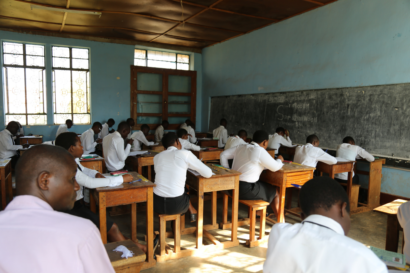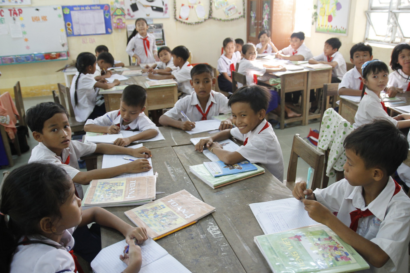 Education
Education
This report provides a rapid evidence summary of the impact of school closures on marginalised girls and presents strategies which involve elements of education technology to mitigate these negative impacts. In considering the broader evidence on what works in supporting marginalised girls’ education, this report focuses on those that could be facilitated, through use of… Read more
In the context of Covid-19-related disruption to education systems all over the world, it is crucially important to ensure that the most vulnerable pupils are protected. Girls, children with special educational needs and disabilities (SEND), and those in poor, remote or pastoralist communities are widely acknowledged to be among the most at-risk of experiencing a… Read more
The Covid-19 pandemic has caused unprecedented disruption to education systems all over the world. As remote schooling becomes the predominant model for education delivery in this crisis, teachers and education system leaders need to adapt to ensure the best outcomes for pupils by distance learning. This report provides a rapid evidence summary of best practice… Read more
This blog originally appeared on the Open University website and is reposted with their permission Measures to control the current pandemic impact more heavily on everyone whose access to internet and digital technologies is limited. But in some countries, the impact can be particularly devastating, says Anna Colom. The COVID-19 pandemic has shed light on the inequalities in access to the… Read more
The general principles of effective pedagogy remain valid in the context of remote learning, but there are additional challenges facing the remote teacher. The highly effective remote teacher must be proficient in the same domains as the face-toface teacher: planning and teaching well-structured lessons (structure), adapting teaching when appropriate to meet individual needs (adaptation), and… Read more
This rapid review focusses on efforts to mitigate the educational impact of previous disease outbreaks, concentrating on school-age learners. It follows two companion papers that reviewed broader secondary effects and attempts to mitigate them (Rohwerder, 2020; Kelly, 2020). It aims to inform the education sector’s responses to the COVID-19 crisis, although there are important differences… Read more
Ministers of Education face hard choices as they respond to Covid-19. Within the education sector, the main response to this unprecedented crisis has been widespread school closures, with far-reaching ramifications: currently, over 1.4 billion learners (or 82.5% of learners around the world), are now affected, with 156 countries enacting nationwide closures. These closures are clearly… Read more
A ‘learning partner’ formative evaluation of StiR Education’s Intrinsic Motivation model STiR Education’s scaling model is predicated on delivering through the system, not just working alongside it. There are no parallel programme delivery structures: STiR works directly with system level roles at the middle tier, including Teacher Development Coordinators (TDCs) and Mentor Teachers (MTs). The… Read more
Effective careers advice is impossible without good quality labour market information. Careers professionals and advisers, the people whose job it is to offer and support careers advice in the community or in schools, are key to success. Vital to their work is access and familiarity with a robust and sophisticated body of intelligence about the… Read more
This report examines four not-for-profit school chains, run by non-governmental organisations in low-income contexts. These are Fe y Alegría, the Bangladesh Rural Advancement Committee (better known by its acronym BRAC), Gyan Shala and Zambia Open Community Schools. These school chains have succeeded in reaching marginalised students and expanding access to hard-to-reach groups. The evidence also… Read more
Vietnam’s government schools have attracted a great deal of international attention since the publication of the 2012 PISA student tests: Vietnamese students performed particularly well in science, ranking eighth globally out of 65 participating jurisdictions; Vietnam maintained this position in 2015. This report investigates what lies behind Vietnam’s learning success. Vietnam’s PISA results have shown… Read more

 Education
Education














